Torbjorn Sindballe Q&A: Part 2
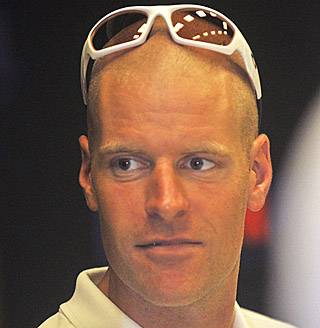
Danish triathlete Torbjorn Sindballe has retired at age 32 due to a dangerous heart valve abnormality, leaving a great career and some unfinished business. Thunder Bear mixed great victories – two ITU long course World Championships and a silver medal, two Oceanside California Ironman 70.3 wins, an Ironman Hawaii bike course record in 2005 and a third place finish at Kona in 2007. Along the way, Sindballe also endured and overcame a string of career-discouraging injuries that culminated with the discovery of a heart valve issue in 2005 that eventually forced his retirement.
In Part 2, Sindballe looks back at his career highlights and disappointments, and looks forward to the second great chapter of his life with his family and new directions in work.
ST: Rasmus Henning says that many Danes revere Ironman winners more than Olympic-style racers. How were you considered at home?
Torbjorn: In terms of the tri community I have gotten so many amazing emails from all over the world including a lot of Danes. I am seriously touched and humbled by all the people taking time to write with inspirations and will respond to them all over the next days.
The Ironman versus Olympic distance is something that is rooted deeply in our sport. As I see it Ironman and non draft racing is what most triathletes want to do themselves and can relate to. This is where our sport originates from and the values that most of us cherish. Olympic style racing was thought up by IOC and ITU as an engineered format that is more television and Olympics friendly. There has been put in massive funds from federations all over the world to basically build a new sport from scratch and they have to a large extent succeeded. The short course athletes are truly amazing and masters the disciplines at a very high level and most federations have well established talent programs in place. However there is still a gap to the age groupers who relate more to non draft and Ironman, but this is probably also the only area where Olympic-style racing tails Ironman. They have built an outstanding series with a global mass media appeal that will grow huge not too far from now and they deliver top entertainment many times a year. Just see the finish in Des Moines. Ironman has a huge challenge to create global platform that transcends the tri world and brings the sport to the masses with Hawaii like fields and excitement throughout the year.
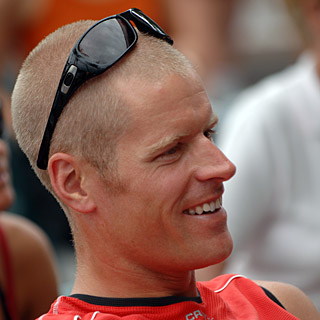
ST: What gives you the most satisfaction about your triathlon career?
Torbjorn: Big question. I think that I have been able to balance the warrior and the family heart so well is key. I have worked super hard and achieved many great things, but I have remained the person I am, positive, curious and caring,
ST: What was your greatest victory – in your mind?
Torbjorn: My 3rd place in Kona and two world champs were obviously greatest, as it is always harder to deliver at major champs than in other races. But on a personal level, my two wins in Oceanside IM 70.3 California is very important to me. In ‘02 I won my first big race by outrunning (!) guys like Craig Alexander, Tim DeBoom, Craig Walton, Cam Brown and many others. This was the greatest running I have ever done. In ‘05 I was equally run fit and paired it with a world class ride and swim in probably the best race I have done, if you look at the level of the performance, not the race or the result.
ST: What part of your satisfaction from your sport was derived by your scientific/Sherlock Holmes style pursuit of answers for your physical issues like heat adaptation in Kona and recovery from Jumpers Knee and I suppose your adaptation to this heart syndrome?
Torbjorn: It was definitely a big part of it alongside the love for challenges, nature and all the amazing people in the sport. From the beginning I have always been curios and if I could not find the solution to a certain problem I have made it myself. To me it was part of the relentless pursuit of excellence and trying to get all those things right to hit the perfect day. The example from Kona was probably the best and most successful example of how thinking out of the box can influence performance.
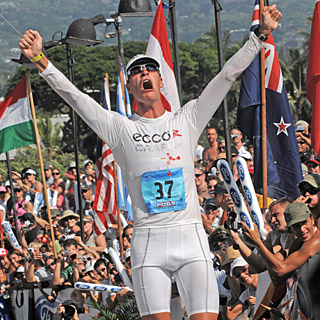
ST: While you are a largely rational person, when in the heat of battle have you switched into the emotional mode?
Torbjorn: When we get a number of races you turn into different people at times. Not that different a person, but so focused. Some times I remember I made a plan how the race would go but in the race the warrior and that emotion would take over and I would go into a completely different state. Some times that would succeed, other times you might fade and crumble. I am usually a rational thinker in what I do. But while racing, you are apt to be much more emotional and get into an unconscious state.
ST: Tell me the name of your dear wife, your children and how old they are?
Torbjorn: My wife is Mette, our 7 year old son is Oskar, and our one month old daughter is called Marie.
ST: When and how did you meet your wife?
Torbjorn: We met at a university party on May 2nd 1997 where a mutual friend introduced us. I was swept away immediately and spent the rest of the night talking her ears off. A few days later, she surrendered to my relentless efforts, but we have not been together ever since like in the fairytales. Even though we got married in 2000 and had Oskar in 2001, we separated and divorced in early ‘04. Three years later, we got back together after several attempts, bought a house two months later and remarried this past December. So we feel pretty sure that it is us forever now.
ST: What are your children’s passions and likes?
Torbjorn: Well the small one is just playing cute all the time and Oskar are really just a perfectly normal amazing kid. He is definitely an active kid and is currently more involved in soccer and Parcours than all that boring reading school stuff. He is very social and loves visiting friends or having them over after school.
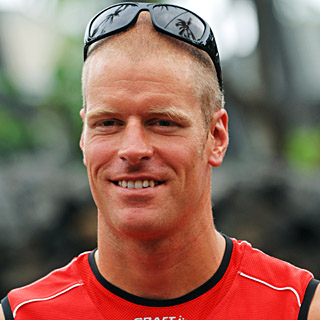
ST: What do learn from your children?
Torbjorn: They teach us most of all. Having children is actually a great balance in many ways. Each one of them becomes their own person with their own opinions, their own will, and their own way of doing things. It’s amazing to see and be part of their world.
ST: What do you want to teach your children about life?
Torbjorn: The world itself develops at am amazingly rapid speed. I’m a parent now and have been so for a while. In my childhood, there was no email, no cell phones, no big Play Stations. There was a very different attitude towards life. In many cases today we consume a lot and just buy what we want. It is extremely difficult to stem that flood. It’s about teaching kids things have value and you must nurture, take an interest in what you do, practice and work hard to achieve things. We have to work all the time to step off the consumption train. At the same time, you are a part of society and in many cases the consumption train is something that is just going and you cannot step completely away from that without sacrificing social relations. So you need a combination, a balance of things and work a lot on your inner life to educate your children and motivate them to have good values and to value the world.
ST: Where do you live? Describe your neighborhood and the joys you feel at home?
Torbjorn: We live in a small beautiful 1951 house, just north of Copenhagen in Hørsholm. We live right next to Oskar’s school (which is much smaller than US schools) so there is no commute and full access to playgrounds and sports courts which we use a lot. We have a wonderful garden with a stream in the back and beautiful tree views. It is quite and beautiful like a home should be. We renovated the house and built a completely new interior with rooms, kitchen etc when we bought it in 2007. Mette’s parents who live just a 10 min walk away have helped us tremendously with this and other projects and are part of our daily lives. The school where Mette teaches is just five minutes away, so we feel privileged to have found such a great place.
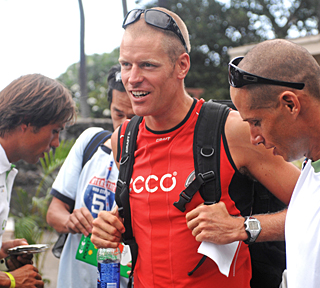
ST: Obviously, you have the intelligence to be a great coach, and the diplomatic skills to be a federation chief or an athlete representative. Do any of those avenues appeal to you?
Torbjorn: Thanks for the nice words. My interest definitely goes towards working with people, helping them become better at what they do and achieve their dreams in a positive, human way. So the coaching part is what seems most appealing. I have a great interest in referring what we have learned as athletes to the business world in human relations and strategic areas so it will probably be a combination of both.
ST: How well do you think Rasmus might do carrying the Danish flag into Kona in your stead?
Torbjorn: He will do very, very well. Rasmus has the potential to win Kona and probably has better genetics than me in key areas. He is balanced in all disciplines, manages the heat well and works super hard, so he can definitely take the big crown if he is not sidelined by injuries and gets his nutrition right.
ST: What was the meaning of your athletic career?
Torbjorn: Being a pro triathlete is in many ways a personal and very self centered journey. So there are times where the broader, human meaningful side of things is sacrificed for performance and personal excellence. I feel thankful and privileged that the people around me have supported me so that I got to realize 99 percent of my potential and have learnt and experienced so many great things along the way. I feel humbled that so many people emailed me with inspirations and in that sense I try to give back as much of what this sport has given me that I can. Throughout my career it has been important to balance the personal performance agenda with my responsibility to my family, sponsors and the incredible triathlon community. I have also felt the need to do what I could for others with my role as an ambassador for “street kids international,” coaching kids’ triathlon here in Denmark, and at one point being chairman in the elite athletes association here in Denmark. All in all, I guess this is the meaning of my career.


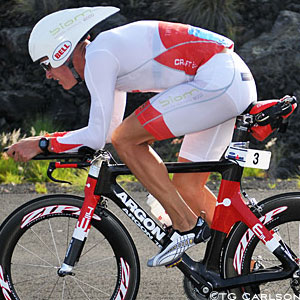
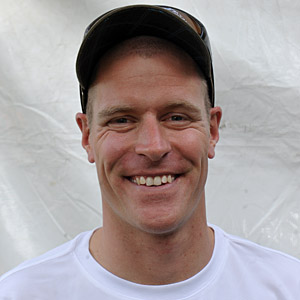
Start the discussion at slowtwitch.northend.network